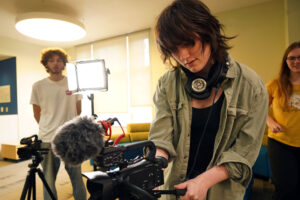
University of Mary Washington senior Stephen McClanahan spent five weeks this summer practicing filmmaking. A psychology major, he saw the session as the next step in carving out the career he’s hoping to build.
“It’s an incredible opportunity to have access to this technology the university offers while also getting hands-on experience with filming and editing footage,” said Rob Willcox, an anthropology and theatre major who also took part in the video project.
Led by Assistant Professor of Communication and Digital Studies J.D. Swerzenski, the summer filmmaking course – packed with interviews, location scouting, lighting set-up, editing and more – was part of UMW’s Arts, Humanities and Social Sciences Summer Institute (AHSSSI). The collection of immersive hands-on learning experiences, designed to give students real-world expertise they can add to their résumés, also included psychology, environmental sociology and 3-D design work, all done side-by-side with faculty mentors.
“Lots of universities offer research opportunities to students, only to have them end up doing menial work. That isn’t what happened this summer,” Tobias Conner, a senior psychology major who plans to pursue a Ph.D., said of AHSSSI, for which students receive free room and board, as well as a paycheck. “We were doing real research every step of the way, from researching our primary sources in week one, to building the study, running participants, and assessing data by the end.”

The institute also instilled teamwork, troubleshooting and presentation skills, said Conner, one of four students who participated in a project that tracks eye movements of test-takers, particularly when a potentially threatening component such as a timer is present. The group, led by Assistant Professor of Psychological Science Marcus Leppanen, spent much of its time in Mercer Hall’s Eye Tracking Lab using a newly purchased Tobii Pro Fusion Eye Tracker, which reflects infrared light off the test-taker’s eye and captures 250 pictures per second.


Sociology majors Viktor Newby and Maggie Dye braved the summertime heat to weed and water campus areas built to host pollinators, like bees and butterflies vital to the environment. Mentored by Associate Professor of Sociology Eric Bonds, the pair compared the policies of areas, like Fredericksburg, that have been named Bee Cities for their efforts to protect essential insects. They also continued the quest to have UMW named a Bee Campus.

A team led by Adjunct Music Instructor Rebecca Callaway and Eagle Pipe Band Interim Conductor Olivia Corcoran built on the work of Mary Washington alumnus AJ Gluchowski ’24, who used a 3D printer to build a bagpipe completely from scratch. “We also wanted to scientifically explore how bagpipes work,” Callaway said.
UMW junior Donald Glander, a history and sociology major, handled that part of the project, while teammate Joe Haun used AutoDesk Fusion 360 modeling software to plan out the printing of drones, stocks and a chante, taking aspects like airspeed and thickness into account.
“It was a great opportunity to work in both fields,” said Haun, a senior music major with a minor in physics, “and collaborate with other people.” The group created filaments, testing for factors like yield stress and tensile strength that create the instrument’s signature sound and used simulation software to examine how the parts worked together.
Meanwhile, Swerzenski’s filmmaking crew captured it all, creating short videos of each of the other three AHSSSI projects, promotional spots for local nonprofits, and interviews of professors and high school students set to take part in Mary Washington’s upcoming Summer Enrichment Program. Along the way, they gathered B-roll, experimented with footage-enhancing equipment and learned to make content accessible.
All valuable skills for McClanahan’s future.
“Wherever I end up after UMW,” he said, “I know that this summer experience will follow me.”
Watch videos of AHSSSI projects:
Eye Spy: AHSSSI Psychology
Bee City FXBG: AHSSSI Sociology
Printing Pipes: An Investigation and Production









It is great to see how these programs contribute to developing the necessary skills and career readiness of students. Such initiatives enhance the value of higher education and help students successfully transition to their professional and personal lives after university. Thank you for sharing these inspiring efforts and I wish the participating students every success